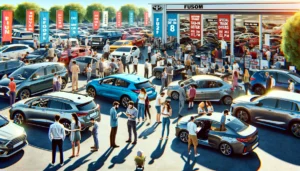The courier industry has seen a surge in business volume, increasing by more than ten times. What used to be completed in 30 minutes now requires continuous work for 12 hours. Four employees resigned due to complaints, leading to a backlog at the courier station. The station owner mentioned that they have started personally delivering packages, but consumers continue to complain about the situation not improving. The new rules introduced by the courier company seem to be merely superficial changes without any substantial improvement.
Recently, I have observed in secret that a new rule implemented by a courier company has sparked a more intense debate on the fifth day, turning the comment section into a large-scale dispute. The voices supporting door-to-door delivery by couriers have become stronger, arguing that home delivery is a matter of course. Some people question why companies like JD and SF Express can deliver goods to the door, but others cannot. Some have raised the question, do we have to personally run 2 kilometres to the post office to pick up rice and oil? Do the elderly have to go to the post office with a cane to pick up their goods? Do pregnant women have to carry their big bellies to pick up their goods? Do disabled people have to go to the post office in a wheelchair to pick up their goods?
Some people believe that delivery workers should be diligent and responsible, and if they are not willing to do the job, they should not be in this industry, as they feel that delivery companies are exploiting them. On the other hand, some people support the idea of having deliveries placed at designated stations for customers to pick up themselves, arguing that it is unreasonable to expect door-to-door service for purchasing inexpensive items. They complain that delivery workers do not answer calls, and do not deliver to their doors, yet they do not wait at the stations for pick-up and demand to file complaints. Delivery workers earn very little money, they are required to provide good service while keeping prices low, customers push for quick deliveries, and the company penalizes them, and property security guards have unfriendly attitudes. Who would be willing to do such a job under these circumstances?
The main roles involved in the express delivery industry include express delivery companies, couriers, customers, and the supervision of e-commerce platforms for businesses. It is unbelievable that a conflict has escalated to such a degree simply because of a phone call. For an industry that is already facing significant challenges, even a small straw can break the nerves of practitioners.
Over the past decade, the unit price in the express delivery industry has been continuously decreasing. It has dropped from 16.29 yuan in 2003 to 8.94 yuan in 2023. Among them, the most significant decrease was seen in the express delivery companies. From January to December 2023, its unit revenue decreased from 2.75 yuan to 2.24 yuan month by month. Meanwhile, in August of last year, the unit revenue of Shentong Express was 2.1 yuan, marking the lowest figure since September 2021. It is worth mentioning that in 2018, Shentong Express had a monthly unit revenue higher than 3 yuan. Even during peak seasons like last October, the unit revenue of Shunfeng Express decreased by 4.17% year-on-year, and the unit revenue of YTO Express was 2.46 yuan, down by 9.36% year-on-year.
According to a report by China Business News, the price war in the express delivery industry has intensified, with the full cost of small parcels now reduced to as low as 1.2 RMB. In addition to this, there are additional costs such as the cost of waybills, transfer transportation, and handling, resulting in the final delivery fee being only a few cents. The surge in express delivery volume is driving this low-price competition. In 2009, the total business volume of national-scale express delivery companies reached 1.86 billion parcels. By 2023, this number had soared to 132.1 billion parcels, growing by tens of times. This growth rate can only be described as “terrifying”. In 2009, YTO Express handled 800,000 parcels per day, which had doubled to 1.6 million parcels per day by 2011, and skyrocketed to 13.87 million parcels per day by 2017. By 2023, the daily business volume of Shentong Express, Yunda Express, and Jitu Express had reached 40 million parcels. Despite the increase in business volume, income is gradually decreasing, leading to significant pressure on delivery personnel.
According to the 9th National Survey on the Status of the Workforce, as of December 2021, the total number of express delivery personnel in China is approximately 4.9 million. The working hours of express delivery couriers are considered unbearable for the average person, with nearly half of them working 10-12 hours a day. Only 30.6% work 8-10 hours, while a significant 21.4% work over 12 hours. With decreasing income and longer working hours, a labour shortage naturally arises.
Recently, Caixin reported on the post-holiday difficulty in recruiting workers, with the express delivery industry being considered one of the hardest-hit sectors this year. Many express delivery outlets are operating at full capacity. The Ministry of Human Resources and Social Security released a list of the top 100 most labor-shortage occupations nationwide, with express delivery couriers ranking third, following sales and automobile production lines. The work of express couriers and factory workers has advanced in other industries, creating a vicious cycle: demanding fast delivery, excellent service, and low prices.
In the impossible triangle framework of timeliness, service, and price, one can only choose two aspects, which has given rise to SF Express and JD.com focusing on quality and timeliness, while YTO Express has chosen to focus on price. This is not just about rationalizing low-cost express delivery companies, but rather a blind pursuit of low prices and efficiency that has led to the distorted development of the industry. On one hand, the unit price of express delivery keeps decreasing, while on the other hand, express delivery companies are making huge profits effortlessly. As of the first half of 2023, ZTO Express made a profit of 44 billion, with a market share of 23%, even more than SF Express; YTO Express made 18.6 billion; STO Express made 2.18 billion; and Yunda’s net profit was 8.69 billion. Over the past two decades, with the expansion of e-commerce and the rise of express logistics, a continuously expanding positive cycle has been formed. The number of express cabinets and stations has surged to the billion level, a product of the continuous expansion of the express delivery scale in pursuit of efficiency. Unlike the United States, China’s high population density and express delivery scale make the cost of delivering parcels to stations more than 50% lower than delivering to homes. In order to be more efficient, the Tongda system on one hand omits the time-consuming process of notifying consumers, attracting more collections at lower prices to increase revenue and profits; on the other hand, it squeezes frontline workers, leading to a decline in service levels, thus entering a vicious cycle.
Therefore, the more critical question is: has the past approach been correct all along? Recently, I have gained some insights and had conversations with delivery workers, including those from JD and SF Express, who remained silent. Yunda and ZTO have adopted a “wait-and-see” strategy. While there is intense debate online, in reality, things are progressing as usual, with free shipping still being offered where applicable, enduring what needs to be endured, and continuing to voice complaints. It seems difficult to make a significant change. Can we not achieve the compromise and harmony that we have always been good at? For example, choosing between home delivery or pickup at a station when placing an order, or using AI intelligent phone calls to confirm requirements by pressing one or zero, can balance interests through cost-effective means that cater to all parties’ needs. There is a recent trend of saying that the purpose of the new delivery regulations is to suppress e-commerce, part of a larger strategic game. The logic seems reasonable – if delivery calls consume time, then increase delivery fees, leading to price hikes on platforms like Pinduoduo, Taobao, and Douyin, followed by regulating online shopping to boost profits for physical stores, subsequently increasing profits for the manufacturing industry, expanding domestic demand, and achieving a perfect internal circulation.
Hey, why are you starting to make major plans again? Do you remember the power restrictions from two years ago? Back then, any logical reasoning that exceeded three steps would become increasingly unreliable. In the economic field, there is no god’s-eye view or foolproof strategy, as every change in each link is subject to a multitude of other factors. Firstly, can the new regulations be strictly enforced? Secondly, once implemented, there could be branch closures, a wave of resignations by delivery personnel, or no one available for deliveries. The third step involves a potential increase in delivery fees, which businesses may not agree to. Even if businesses accept it, platforms like Pinduoduo, Taobao, Vipshop, and Douyin would not dare to offer 9.9 yuan for shipping, as consumers would immediately oppose it. As for the fourth, fifth, and sixth steps, each link is difficult to quantify. Rapid urbanization has led to a spiral increase in housing prices and rents, the challenging balance of exchange rates and interest rates, the impact of domestic and foreign demand on foreign trade and real estate, income pressures, the fairness of income distribution structures, changes in consumer preferences among the Chinese people, and intense competition among e-commerce platforms. It can be said that the new regulations are not aimed at suppressing e-commerce but rather seem to be putting express delivery companies that focus solely on efficiency and overlook the survival of delivery personnel in difficult situations.
This year, in addition to equipment upgrades and trade-ins, we also have a goal to effectively reduce the overall logistics costs in society. In recent years, Tongda Xing has been continuously advancing, focusing on reducing the costs of transit transportation and delivery, while the industry concentration has been increasing. However, there has been a neglect of differentiation in end services. In this sense, the new regulations are like throwing a catfish into the stagnant pond of the express delivery industry. Whether it’s home delivery, self-pickup lockers, or station pick-up, different customers have different needs. Consumers have the right and willingness to pay for differentiated end services. The scale of trunk transportation and the differentiation of end services should have been the rules of survival of the fittest in the competition of the express delivery industry. Whether to complain or not is up to the consumers, whether to impose fines is up to the regulatory authorities, and whether these can be achieved depends on the express delivery companies themselves.


